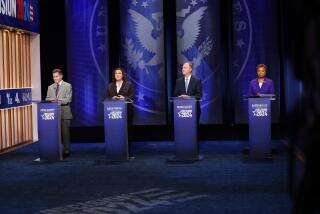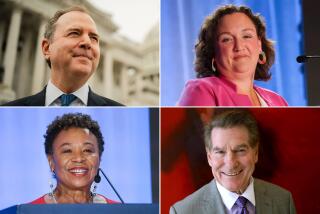Clinton Lashes Out at Brown Over Campaign Finance Reform : Politics: Arkansas governor accuses rival of hypocrisy during Buffalo, N.Y., debate. He turns down challenge to debate money issue in Harlem.
- Share via
BUFFALO, N.Y. — Arkansas Gov. Bill Clinton took an unexpected swipe at Democratic rival Edmund G. (Jerry) Brown Jr. on Saturday, accusing the former California governor of hypocrisy in his belated conversion to the cause of campaign finance reform.
At the end of an otherwise tame debate among Clinton, Brown and two of the party’s long-shot presidential hopefuls--former Minnesota Sen. Eugene J. McCarthy and former Irvine Mayor Larry Agran--Clinton, who has been on the receiving end of a series of Brown broadsides, reversed roles and lashed out at Brown’s work as a political money man.
“By his own admission, (Brown) was still shaking the money tree in the 1980s when I was out working for real political reform,” Clinton told a crowd of more than 2,000 that packed Shea’s Buffalo Performing Arts Center.
Clinton’s remarks referred to Brown’s efforts as a fund-raiser for the California Democratic Party in 1989 and 1990, when Brown served as party chairman. But now, Brown has built his presidential campaign into a crusade against what he calls the corruption of the political Establishment.
As part of that effort, he refuses to accept contributions exceeding $100.
“In 1990,” Clinton said Saturday, “Gov. Brown testified in California against limits on campaign contributions. And his law firm got $178,000 in taxpayer money for defeating the California contribution limits.”
Brown was apparently taken off guard by Clinton’s comments and had already exhausted his time for final comments. But he seized the microphone and challenged Clinton to debate the money issue at the Apollo Theater in Harlem.
As he was leaving the debate site, Clinton turned down the request. “We’ve got lots of debates; we have more than enough debates,” Clinton told reporters.
Clinton’s comments about Brown and his law firm involved the former governor’s role, as state party chairman, in seeking to overturn California’s Prop. 73. The initiative, approved by voters in 1988, imposed a $1,000 limit on individual contributions to candidates for state office. The proposition ultimately was ruled unconstitutional.
According to a March 13 account in the San Francisco Chronicle, Brown testified against the measure in 1990 in a deposition for a lawsuit. And his firm, Fulbright & Jaworski, subsequently submitted a bill to the state for $178,000 for work it conducted against the initiative on behalf of the state Democratic Party and the state Legislature, the Chronicle said.
The exchange between Clinton and Brown capped a 90-minute debate during which Brown emphasized his role as a political outsider campaigning against a system he argues has been corrupted by large campaign contributions from special interest groups.
“We can stop turning this planet into a stinking junkyard, (but) it cannot be done by just going along and getting along and saying we’re all fine,” Brown told the Buffalo crowd, which lavished its loudest applause on him. “I’m not here to go along and get along, I’m here to confront a corrupt status quo.”
Brown was unusually solicitous toward Clinton during the debate, in which the candidates vied for support in New York’s April 7 primary.
After the debate, Brown said concern within his camp that Clinton might refuse to accept future debates, now that the contest is down to two major candidates, prompted him to focus on his own positions rather than go on the attack.
Just last Sunday, in a debate in Chicago, Brown accused Clinton of steering lucrative Arkansas state contracts to the law firm in which his wife, Hillary, is a partner. Clinton strongly denied the charge.
Brown also frequently has questioned Clinton’s “electability” because of unsubstantiated allegations about marital infidelity and questions about the Arkansas governor’s Vietnam War-era draft record.
Clinton’s attack on Brown appeared to represent an almost overnight shift in strategy. As late as Friday afternoon, some Clinton aides were suggesting that Clinton might not even show up for the Buffalo debate, suggesting that the real race is now between Clinton and President Bush.
One campaign insider said the question of how much attention to direct at deflecting Brown’s challenge remains unsettled.
Until Clinton went on the offensive, most of the brickbats thrown Saturday were directed at the President, and many of the most amusing were hurled by McCarthy, who is best known for his strong showing against then-President Lyndon B. Johnson in the 1968 New Hampshire primary. Shortly after the New Hampshire contest, Johnson decided not to seek reelection.
Declining an invitation to grade Bush’s performance as the self-styled “education President,” McCarthy said: “I don’t even want to rate George Bush. He has probably done more to destroy the English language than Karl Marx.”
McCarthy also said that Bush has shown a disdain for the institutions of government. Referring to Bush’s controversial selection of Dan Quayle as his running mate in 1988, McCarthy said: “He has disdain even for the vice presidency, and that is hard to do.”
Agran won loud applause for some of his views--including a proposal that buyers of handguns should pay an extra $25 per purchase for a fund to compensate the victims of firearms.
Times staff writer George Skelton contributed to this story.
More to Read
Get the L.A. Times Politics newsletter
Deeply reported insights into legislation, politics and policy from Sacramento, Washington and beyond. In your inbox twice per week.
You may occasionally receive promotional content from the Los Angeles Times.










